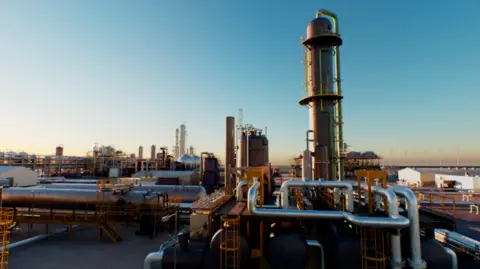Hydrogen plant could face more emissions scrutiny
 BP
BPBP may need to further assess the nitrogen its new hydrogen plant could release into the environment before it can be given planning permission, the government has said.
The multinational is seeking a development consent order (DCO), which is required for nationally significant infrastructure projects, to build H2Teesside in Redcar.
As part of this process, the Department for Energy Security and Net Zero (DESNZ) suggested last week BP might need to conduct more research into the impact the plant's nitrogen emissions could have on the Teesside coast before it was given a DCO for the plans.
BP said it would respond in due course, while DESNZ has declined to comment.
DESNZ is now seeking the views of Natural England, as well as the local authorities in Stockton, Hartlepool and Redcar about its suggestion that BP should conduct more nitrogen analysis before it is given permission to build the hydrogen plant.
Specifically it is seeking to better understand the impact the plant may have on the Teesmouth and Cleveland coast, which is a site of special scientific interest (SSSI).
BP has said H2Teesside would be one of the largest blue hydrogen plants, which split natural gas into hydrogen and carbon dioxide, in the UK.
'Duplication of work'
One way in which nitrogen emissions could impact the local environment is by affecting sand dunes.
Nitrogen pollution can cause losses in dune biodiversity and alter soil processes, according to the UK Centre for Ecology and Hydrogen.
Institute of Engineering and Technology official James Bamborough said BP had already conducted some initial modelling about the plant's potential nitrogen emissions but DESNZ was now seeking a fuller analysis.
In previous correspondence published between BP and DESNZ, the multinational had argued against including an extensive nitrogen analysis as part of the DCO process, according to Mr Bamborough.
"BP are arguing that this would have to be done anyway for the Environment Agency [after H2Teesside had been granted a DCO] and would be a duplication of work," he said.
BP's initial analysis had suggested the plant would lead to "no likely significant residual effect" on the SSSI.
Redcar and Cleveland Borough Council said it supported the "principle" of H2Teesside and that if the plant gained permission it would work with BP and Natural England to ensure the "environmental impacts of the development were properly addressed".
Hartlepool Borough Council said it would respond to DESNZ, while Stockton Borough Council and Natural England have been approached for comment.
